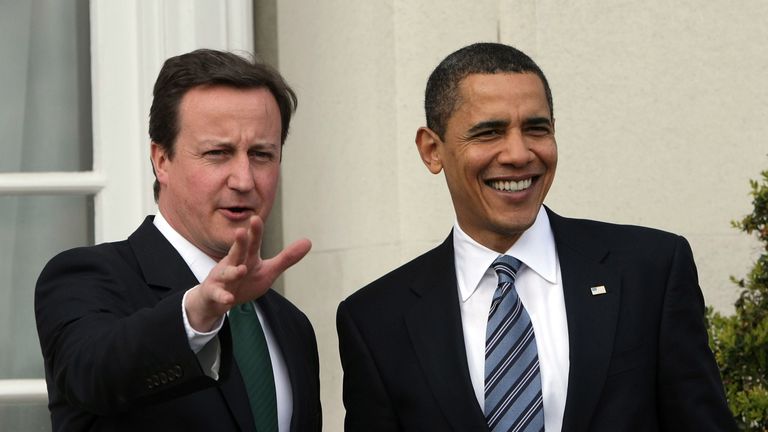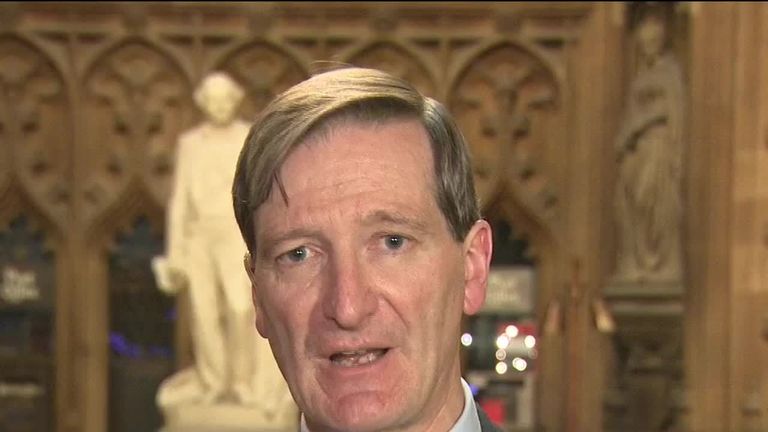New record for biggest defeat ever suffered by a government

Tuesday 15 January 2019 23:11, UK
Just as the predictions suggested, Theresa May has fallen to the heaviest House of Commons defeat ever experienced by a government since the First World War.
MPs roundly rejected her Brexit deal by 432 votes to 202 - an emphatic margin of 230.
It joins an ignominious collection of other humiliating parliamentary losses for sitting prime ministers, which have resulted historic rebellions, early general elections and for some the beginning of the end for the premiership.
Sky News looks back at some of the most significant occasions on which a UK government has been beaten.
The previous record was held by Ramsay MacDonald, who led a minority Labour government when he went down to a humiliating defeat of 166.
It was over an amendment put forward by the Liberal Party to set up a select committee to investigate a government decision to drop criminal proceedings against the editor of the Communist newspaper Workers Weekly, which had recently published an article encouraging the armed forces to mutiny.
After the government lost by 364 votes to 198, the prime minister declared the issue a matter of confidence and obtained a dissolution of the Commons the following day, which led to a general election that Labour lost.
Labour was again in power on the most recent occasion a government lost a confidence motion.
Prime minister Jim Callaghan called the motion on the back of a couple of major defeats, one by 86 in January 1978 after MPs backed an amendment to the Scotland Devolution Bill.
Then, on 22 March 1979, his government suffered one of the heaviest defeats in Commons history over a motion to annul the fees for a firearms certificate. MPs voted by 115 to 26 and a confidence motion followed just six days later.
The Labour leader lost it by just one vote - 311-310 - and immediately announced a dissolution of parliament and a general election, which was subsequently won by the Conservatives.
David Cameron was in a position of relative comfort back in 2013, but was unable to persuade parliament to join the US and back military action in Syria that summer.
He said it was "clear" that MPs did not want to see Britain get involved in strikes against President Bashar al-Assad, despite a suspected chemical weapons attack a week before.
Opposition leader Ed Miliband said the Commons had spoken "for the people of Britain" and that the population wanted the government "to learn the lessons of Iraq".
Britain has since become resigned to President Assad remaining in power and Russia gaining a new sphere of influence in the region, according to current Foreign Secretary Jeremy Hunt.
Following the general election of 2015, the Conservatives held a slim Commons majority of 12.
It left Mr Cameron vulnerable to rebellions by his own MPs, and they duly delivered his first defeat of his second term as prime minister over proposals to change rules that restrict government campaigning before an election.
The government originally wanted to suspend purdah ahead of the EU referendum and then agreed to water down its plans, but a group of Eurosceptics and Labour still ensured it lost the vote in September 2015 by 27.
Number 10 had wanted to allow ministers and officials to talk openly about the EU as long as this was not directly related to the referendum or could be construed as a bid to influence the result.
Mr Cameron, of course, ended up losing the referendum, resigning as prime minister, and now we are here.
There have been doubts about the Brexit plan negotiated by Mrs May ever since the Chequers meeting last summer, but things really started to unravel in the weeks before Christmas.
In a joint bid by six political parties on 4 December, including Labour and the DUP, MPs moved to hold ministers in "contempt of parliament" for refusing to release the full legal advice offered on the Brexit divorce deal.
Despite a vote last month ordering it be published, Attorney General Geoffrey Cox had refused to comply because it was not in the "public interest".
The government tried to get around that by adding an amendment that kicked the decision into the long grass by referring it to a committee, but it lost by 311 votes to 307.
Sharp gasps of breath were later heard through the chamber when it emerged that - for the first time in history - MPs found the government in contempt of parliament by 311 votes to 293.
No amount of mince pies, mulled wine and re-runs of Father Ted seemed to improve the mood of MPs by the time they got back to Westminster, as they inflicted two more bouts of woe upon the prime minister in quick succession.
First up on 8 January was an amendment to the Finance Bill, which aimed to put a limit on government powers in the event of a "no-deal" scenario.
Twenty Tory MPs, including 17 former ministers, staged a rebellion to inflict the defeat upon Mrs May - the first reverse for a government on such legislation since 1978.
Just a day later, the pro-Europe Conservative Dominic Grieve proposed a change to how Brexit will progress if - as expected - Mrs May loses the "meaningful vote" on Tuesday.
Prior to his amendment, the prime minister would have had to give a statement signalling her steps to avoid no-deal within three weeks, but Mr Grieve thought MPs should be able to amend that statement.
It went through by 321 votes to 299 and makes it less likely that the UK could leave the EU without a deal.
Arguably one of the most significant government defeats in history came outside the Commons.
Indeed, you would not even be reading this if Remain campaigner Gina Miller had not challenged the government over the invoking of Article 50 on 29 March 2017 - setting a two-year deadline to complete Brexit.
Ms Miller said parliament should have voted before Article 50 was invoked and won her case, with High Court judges ruling that authorisation by MPs would therefore be required for the final deal negotiated by Mrs May.
The decision was also upheld by the Supreme Court on appeal - and now that ruling has come home to roost.











